DAKAR, Senegal (AP) — President Barack Obama opened a weeklong trip to Africa on Wednesday, a three-country visit aimed at overcoming disappointment on the continent over the first black U.S. president's lack of personal engagement during his first term.
However, the highly anticipated trip threatens to be overshadowed by the deteriorating health of beloved former South African President Nelson Mandela.
Air Force One touched down in the Senegalese capital of Dakar on Wednesday evening. The president, who is traveling with first lady Michelle Obama and daughters Malia and Sasha, is also scheduled to visit South Africa and Tanzania.
The president is expected to be greeted warmly during his trip, despite the underlying sense of disappointment. American flags dotted the roadways as Obama's motorcade sped through this coastal city, and signs welcoming Obama and bearing his picture hung on homes and businesses.
Obama's father was born in Kenya and several of his relatives still live there. But despite his family ties to the continent, Obama spent just one day in Africa during his first four years in office and has focused instead on strengthening U.S. ties with Asia and Latin America.
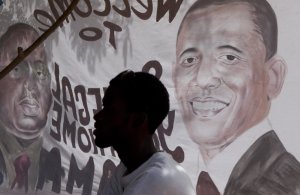
A man sits in the shade behind a banner depicting U.S. President Barack Obama and Senegalese Preside …
"Africans were very excited when President Obama was elected and they expected deeper engagement than in the past, both in regard to policy and also in terms of actual visits to the continent, given the president's African heritage," said Mwangi Kimenyi, an Africa analyst at the Washington-based Brookings Institution. "Africans have been gradually disappointed, especially when they look at the focus on Africa by previous presidents, in particular President Clinton and President George W. Bush, who did quite a bit there."
Few major policy announcements are expected during Obama's trip. Instead, the president will focus on promoting democratic institutions, boosting opportunities for Africa's vast youth population and promoting the continent as a growing market for U.S. businesses.
The White House defended the purpose of the trip despite its low policy expectations.
"Presidential trips to regions of the world like Africa bring enormous benefits in terms of our relationship with the countries visited and the countries in the region," spokesman Jay Carney told reporters traveling with Obama on Air Force One. "The trip itself will not be the end point of our engagement, but will enhance it, deepen it and further it."
The president will make two stops at sights that highlight the continent's harsh racial history: Senegal's Goree Island, which was the center of Atlantic slave trade and Robben Island, the apartheid-era prison in South Africa where Mandela spent 18 years of his 27 years in prison.
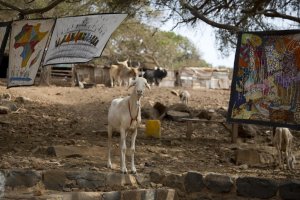
A goat stands among painting for sale on Goree Island, Senegal, Wednesday, June 26, 2013. Goree Isla …
The White House is closely monitoring Mandela's health, which has added a degree of uncertainty to Obama's travel itinerary. The 94-year-old anti-apartheid leader has been hospitalized for about three weeks with a reoccurring lung infection and South African officials have now deemed his condition critical.
Obama advisers have been reluctant to publicly discuss what impact his condition might have on Obama's trip. There had been no formal plans for the two men to meet, though Obama aides did leave open the possibility of the U.S. president meeting with Mandela's family.
"Ultimately, we want whatever is in the best interest of his health and the peace of mind of the Mandela family," said Ben Rhodes, Obama's deputy national security adviser.
The president had no public events planned Wednesday after his arrival. He was scheduled to spend Thursday meeting with Senagalese President Macky Sall, then meet with civil society leaders at Goree Island.
Top White House economic advisers and U.S. business leaders were traveling with Obama, underscoring the trip's focus on boosting American economic ties with Africa. Six of the world's 10 fastest-growing economies last year were in Africa, according to the World Bank.
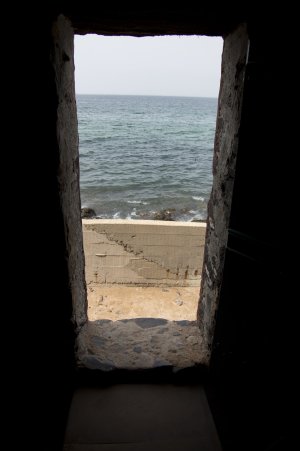
The Door of No Return in House of Slaves, a museum and memorial to the Atlantic slave trade, is seen …
While the U.S. has been slow to ramp up its trade with Africa, China, along with India, Malaysia and Brazil, have been building robust economic relationships on the continent. Chinese officials say Beijing's trade with China totaled $200 billion last year. The U.S. Trade Representative said American trade with Africa reached $95 billion in 2011.
1 of 5
5 of 5
U.S. President Barack Obama is welcomed by a Senegalese honor guard as he arrives at the presidential palace in Dakar, Senegal, Thursday, June 27, 2013. President Obama landed in Senegal Wednesday night to kick off a … more
U.S. President Barack Obama waves as he poses for a picture alongside U.S. First Lady Michelle Obama, second right, Senegalese President Macky Sall, right, and Senegalese First Lady Mariame Faye Sall at the presidential … more Senegalese President Macky Sall, right, gestures for U.S. President Barack Obama to sit during a bilateral meeting at the Presidential Palace on Thursday, June 27, 2013, in Dakar, Senegal. President Obama landed in … more
U.S. President Barack Obama, left, speaks with Senegalese President Macky Sall during a bilateral meeting at the Presidential Palace on Thursday, June 27, 2013, in Dakar, Senegal. President Obama landed in Senegal … more
Obama starts long awaited Africa tour at slave port
By Mark Felsenthal
DAKAR, Senegal (Reuters) -
Almost four centuries after Africans started being shipped to North America as slaves, the first U.S. president of African ancestry will on Thursday visit an infamous embarkation point for those destined for lives in chains.
In his first - and, many Africans say, long-overdue - extended tour of the continent, President Barack Obama will focus on political and economic issues, but is also paying homage to a painful chapter in American history.
On the first leg of his eight-day visit he is taking his family to the House of Slaves, a fort built in the late 18th century on Goree Island, off the coast of Senegal, as a transit point for the human traffic and now a museum.
The visit will be a somber reminder of a shameful period in U.S. and world history and provide a powerful contrast between Obama's stature as leader of the world's most powerful nation and the historical status of Africans, once treated as property in the country he governs.
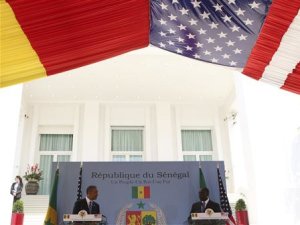
U.S. President Barack Obama (L) and Senegal President Macky Sall attend a joint news conference at t …
"We have moved from a society in which African Americans were not viewed as citizens, in which social, economic equality was not provided, to one in which we could elect an African American president," said Junius Rodriguez, a historian at Eureka College in Peoria, Illinois.
"It's a remarkable transformation that we've made."
Many Africans feel a bond with Obama but have voiced disappointment that he has not engaged with the continent as much as previous presidents George W. Bush and Bill Clinton.
During his first term, Obama's only African trip was a one-day stopover in Ghana and many Africans have been impatient for him to make an extended tour of the continent.
"It's a real pleasure for us, that the world has advanced enough that a black man can be president of the United States," said Abdoul Aziz Signane, a tailor, purchasing an Obama T-shirt at a shop in the Senegalese capital Dakar.
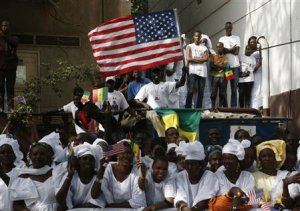
Senegalese watch as U.S. President Barack Obama's motorcade drives past on his way to meet with Sene …
"It makes us very proud. That's why I came to buy a T-shirt so I can welcome him and tell him 'We love you Obama, a lot'."
APOLOGY UNLIKELY
While George W. Bush gave a speech at Goree Island in 2003 in which he called slavery a sin, Obama is not scheduled to use the occasion to make a speech.
The president's major address during his three-country swing through Africa is scheduled for Sunday at the University of Cape Town.
Obama - who visited Cape Coast Castle, another slave port, during his Ghana trip in 2009 - will meet civic leaders in Goree before returning to the mainland to talk with lawyers and judges, keeping the emphasis of his trip on African political stability and economic opportunities.
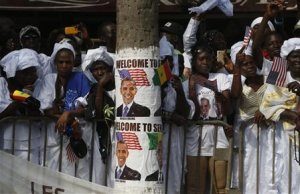
Senegalese women watch as U.S. President Barack Obama's motorcade drives past on his way to meet wit …
For all the symbolism involved in Obama's trip to Goree, it raises the question of whether the time has come for a U.S. president to apologize for slavery.
"The magnitude of slavery is unimaginable," Harvard historian Johnson said. "Can Obama heal that wound with a single speech and with the extraordinary symbolism of his visit as U.S. president, is that going to close the circle? Absolutely not."
But an apology is seen as unlikely. A sovereign admission of culpability would open the door to a reparations process, something the Obama administration is unlikely to initiate.
(Editing by Robin Pomeroy)
Obama Says Mandela's a 'Hero for the World'
Jun 27, 2013 8:20am
DAKAR, Senegal — Reflecting on the life on Nelson Mandela, President Obama this morning called the ill civil rights leader a "hero for the world" and said his legacy will linger through the ages.
Speaking at a joint press conference with Senegalese President Macky Sall, Obama said Mandela inspired him to get involved in political activism.
As a college student, Obama said he "read [Mandela's] writings and his speeches and I understood that this was somebody who believes in that basic principle… treating people equally, and was willing to sacrifice his life for that belief.
"To see Nelson Mandela step forward after 27 years of captivity and not only help usher in democracy and majority rule and one person one vote in South Africa but, as importantly, for him to say, 'I embrace my former captures and my former oppressors and believe in one nation and believe in judging people on the basis of their character and not their color,' you know, it gave me a sense of what is possible in the world, when righteous people, when people of good will, work together on behalf of a larger cause," Obama said.
Obama extended his thoughts and prayers to the people of South Africa and to the Mandela family.
"I've had the privilege of meeting Madiba and speaking to him. He is a personal hero, but I don't think I'm unique in that regard," he said. "I think he is a hero for the world. If and when he passes from this place, one thing I think we will all know is that his legacy is one that will linger on throughout the ages."
The president reiterated that he will be traveling to South Africa "over the next several days" after he leaves Senegal. Obama is currently scheduled to travel to South Africa tomorrow.
Mike Pflanz 15 hours ago
Barack Obama landed tonight in
Senegal on the first leg of a three-nation
Africa tour made both emotional and symbolic by the ailing health of Nelson Mandela, Africa's paramount moral leader for much of the 20th century, who is described as in critical condition at a hospital in Pretoria.
The White House is scheduled to visit
South Africa Friday, after a visit in Dakar that will include a meeting with Macky Sall, the Senegalese president -- and the trip will then include a brief and private Obama family visit to Slave House, the oceanside portal from which captured Africans were onloaded to ships run by slave traders.
Next week the White House entourage will visit Tanzania.
Yet for now the Mandela-Obama dynamic is capturing the most attention: Whether the first black American president can or will possibly meet with the first black and democratically elected president of formerly white-ruled South Africa is highly unclear, and Obama's aides suggest their plans are forming day-by-day.
The South African leg is resonant with some historical echoes. As we reported yesterday:
In June 1966, at the University of Cape Town in apartheid
South Africa,
Bobby Kennedy gave a speech that eulogized the power of the individual to overcome even the most powerful tyranny.
"Each time a man stands up for an ideal, or acts to improve the lot of others, or strikes out against injustice," Senator Kennedy told the students, "he sends forth a tiny ripple of hope, and … those ripples build a current which can sweep down the mightiest walls of oppression and resistance.
On Sunday, Obama, a man who has made "hope" his watchword, and whose father was
Kenyan, will give a speech at the same South African university.
RECOMMENDED: Think you know Africa? Take our geography quiz.
The speech is eagerly awaited. When Mr. Obama won the 2008 election, Africans erupted into near-unanimous joy that an American of African heritage would for the first time be president of the
United States. Perhaps, many hoped, he would help build "ripples" into "currents" to tackle Africa's entrenched challenges.
"Guys went nuts," says Octopizzo, a rising hip-hop artist from the slums of Kenya's capital Nairobi. "He was seen as a real hero for Africa, because he changed the way people looked at themselves. People used to set themselves standards, goals, and try to pass them. Obama made us build higher standards and set higher goals, and inspired us to reach them."
But now, five years later, there is disappointment at a lack of substantive new continent-wide assistance programs from the man some in Africa once called a messiah.
Obama's predecessor, George W. Bush, launched the multi-billion-dollar President's Emergency Plan for AIDS Relief, credited with averting 1.1 million deaths from AIDS in Africa. Obama effectively cut its funding in 2009.
President Bill Clinton was hugely popular among ordinary Africans. He was more so with the African business community for initiating the African Growth and Opportunity Act, which cut or scrapped duty for goods from the continent exported to the US.
So far, however, there have been no such major initiatives from Obama, the son of a Kenyan economist who grew up a poor goatherd. In the meantime, China, Turkey, Brazil, and other emerging nations are sweeping across Africa, gaining influence and lucrative contracts.
"In some parts of the continent, his gloss has not come off, but in many places, it has," says Steven Friedman, a South African academic specializing in democracy studies.
"There's no great mystery to it – he is the first African-American president, whose father was a Kenyan, and perhaps that raised expectations. In fact, it likely made him more reluctant than his predecessors to be some great savior for Africa.
"He's had major problems at home, but he's also had to go out of his way to demonstrate that he's the American president, not the African president, and as a result he's not done terribly much here."
Obama has barely visited, in fact, spending only 22 hours in sub-Saharan Africa during a fly-by through Ghana in 2009.
Tomorrow's trip that will include Senegal, South Africa, and Tanzania, may either be his only major visit here as president, or the start of a more regular second-term involvement.
White House officials argue that there have been major engagements with the continent since 2008.
Obama has held meetings with African leaders focused on food security and nutrition. America's military has been involved in conflicts in Somalia, Mali, Libya, the Central African Republic, and
Uganda. The US remains the world's largest contributor of humanitarian aid to Africa.
Nonetheless, Obama's team is acutely conscious of the anticipation ahead of the tour.
"Frankly, there's been great disappointment that the president hasn't traveled to Africa until this point, other than a brief stop in Ghana," Ben Rhodes, deputy national security adviser, told reporters in a recent White House briefing. "Africa is a critically important region of the world. We have huge interests there. We need to be present in Africa."
The stated aims of the visit, to Africa's west, its south, and its east, are to boost US trade and investment, encourage democracy, advance food security and health, and inspire young people.
For Charles Dokubo, research professor at the Nigerian Institute of International Affairs in Lagos, what is expected from Obama's visit are "actions, not promises."
"If he wants to make any difference in Africa, truly we want to see actions that that improve the social provisioning for Africa's people, not promises," Mr. Dokubo says. "Until Obama brings about something that makes that happen, he is like any other president."
That misses the point of Obama's power in Africa, says Rosebell Kagumire, a respected Ugandan rights activist and blogger.
"Obama will always be a role model, especially for our young people who very much look up to him in a place where we're very short of good role models," she says. "He understands the continent and has more links to here than any other US president before him, and his approach is very different from that of a traditional donor who comes with promises to fix everything for us."
Ms. Kagumire continues: "Obama is almost hands-off, which has been criticized as doing nothing. But in fact it allows us the space to search for our own solutions. He'll support Africa then, when it's necessary and when it's still in US interests. But he's right that it's up to Africans, not outsiders, to fix our problems."
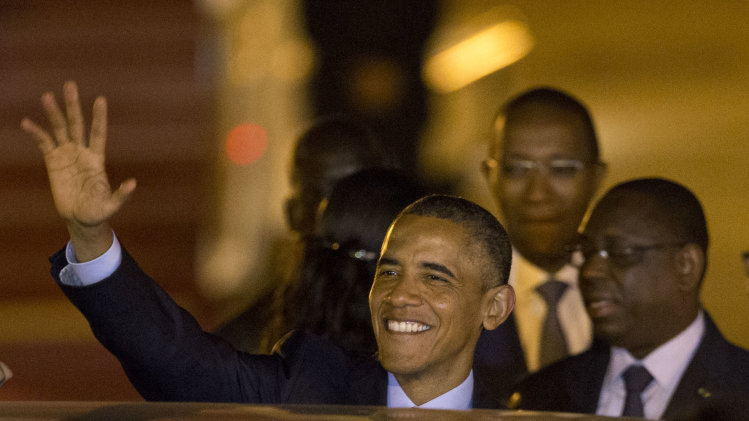



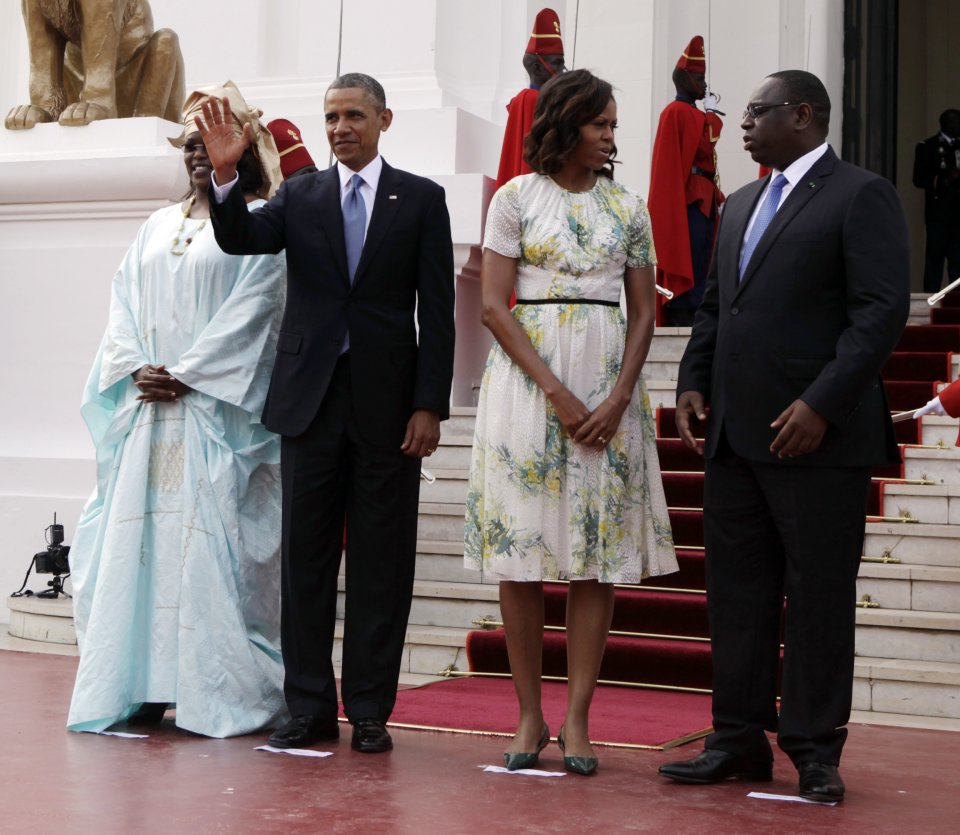
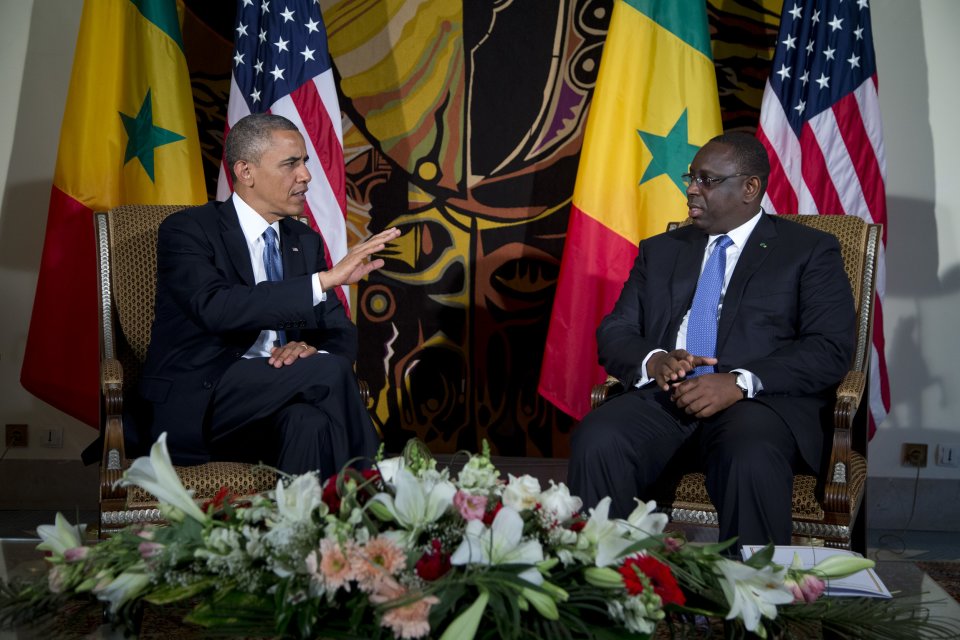
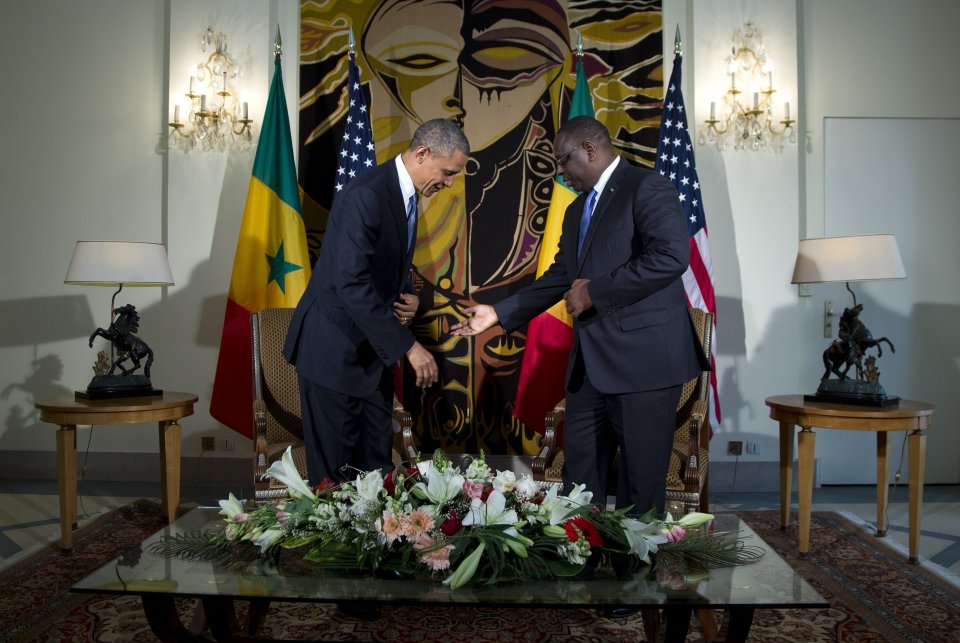
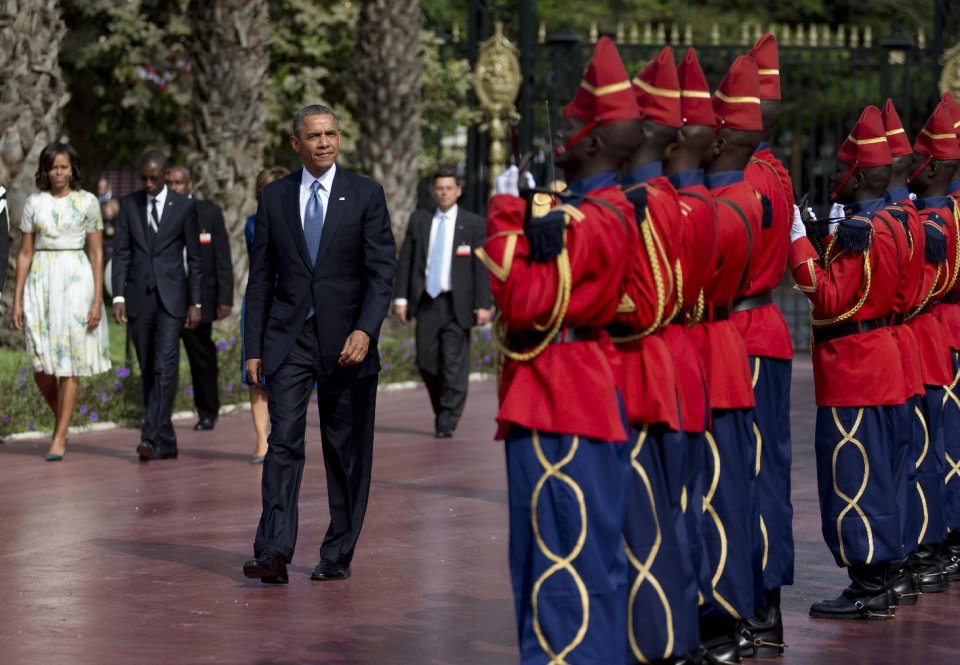




0 comments:
Post a Comment